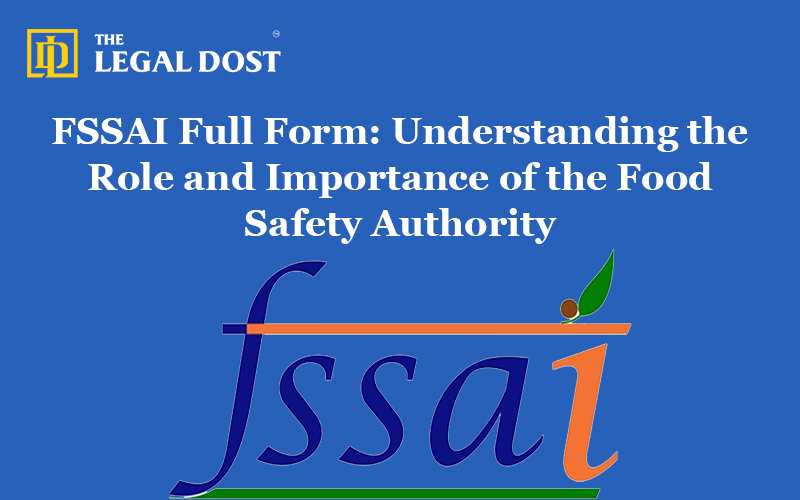Food safety is crucial for public health. In India, the Food Safety and Standards Authority of India (FSSAI) is in charge of setting as well as maintaining food guidelines. This blog gives you a complete picture of FSSAI, what it does, and how it helps make sure the food we eat is safe.
What is FSSAI?
FSSAI’s full name is Food Safety and Standards Authority of India. The government office is part of the Ministry of Health and Family Welfare. Its creation aimed to protect public health by making sure adherence to food safety regulations throughout the food supply chain.
Key Responsibilities of FSSAI:
- Setting scientific standards for food safety.
- Registration and licensing of food businesses.
- Increasing consumer and business awareness of secure food practices.
- Ensuring compliance with the FSSAI rules and pursuing penalties against those who violate them.
History and Headquarters
When was FSSAI established? FSSAI was established in 2006 under the Food Safety and Standards Act, 2006; however, it did not become operational until 2011. Its primary goal is to streamline the numerous food laws in India into a unified framework that enables efficient monitoring.
FSSAI headquarters are in New Delhi, and there are also offices in Mumbai, Chennai, as well as Kolkata. Food safety rules must be followed perfectly across the whole country, and these places make sure that they are.
FSSAI Logo and Symbol
Packaged food products display the FSSAI logo as a recognizable symbol to indicate compliance with FSSAI standards.
Why is the FSSAI Symbol Important?
- FSSAI-marked food ensures consumer safety, cleanliness, and quality.
- It makes it easier to find goods that meet government standards, which provides consumers with more confidence.
FSSAI License: What Does it Mean?
A license from the FSSAI is required for all Food Business Operators (FBOs). This includes food manufacturers, retailers, and other people with a stake in the food business.
- FBO ID means: A unique identifier provided to each FBO for tracking and compliance reasons.
- The license makes sure that food firms follow FSSAI’s safety criteria.
To make the licensing procedure easier, FSSAI launched the Food Safety Compliance System (FOSCOS), a digital portal where businesses may apply for licenses, renewals, and modifications.
FSSAI Rules and Regulations
The FSSAI regulations aim to govern every facet of the food industry, encompassing production, packaging, and distribution. These include:
- Labeling and Packaging: Clear labeling that includes information such as ingredients, nutritional values, and expiration dates.
- Hygiene Practices: Maintaining good hygiene when handling and storing food.
- Testing and Certification: Food items need to be tested on a regular basis to make sure they follow the rules.
Penalties, license suspension, or cancellation may result from breaking these regulations.
FSSAI and FOSCOS: A Step Towards Digital Transformation
The full form of FOSCOS is the Food Safety Compliance System, which is an easy-to-use website that was made to make getting licenses and following rules easier for businesses. It helps:
- Streamline the steps for approval and documentation.
- Increase the transparency of operations.
- Make it simple for businesses all over the country to follow the rules.
Role and Importance of FSSAI
The role of FSSAI extends beyond mere regulation. Furthermore, it:
- Enhances consumer confidence in food safety.
- It safeguards the public’s health by reducing the likelihood of foodborne illnesses.
- It encourages fair trade methods within the food sector.
- The government fosters innovation by approving new food products through scientific evaluations.
FSSAI’s Outreach and Vision for the Future
FSSAI works with state governments and other groups to run campaigns, hold workshops, and work together to support safe food practices. In its long-term plans, it has:
- India is striving to become a global leader in food safety standards.
- Reducing instances of food adulteration.
- The goal of initiatives like the Eat Right Movement is to promote healthy eating habits.
Summary
The FSSAI definition states that its goal is to maintain public health by adhering to strict food safety regulations. The FSSAI’s regulation as well as licensing of FBOs are essential to the food industry. Food bearing the FSSAI mark is high-quality and safe.
In order to create a safer food ecosystem in India, FSSAI keeps pushing for consumer knowledge, compliance, and openness. To learn more about FSSAI information, go to fssai.gov.in their official URL.
FSSAI Full Form: Understanding the Role and Importance of the Food Safety Authority (FAQ’s)
The full form of FSSAI is known as “Food Safety and Standards Authority of India.” It is a government-run organization that makes sure India’s food is safe and of good quality.
FSSAI means the regulatory body in charge of making sure food safety. The functions of FSSAI include licensing, inspecting, establishing food standards, as well as encouraging safe food practices.
The Food Safety and Standards Act of 2006 served as its foundation.
The acronym FBO stands for Food Business Operator. All FBOs in FSSAI need to register and get a license to make sure they follow food safety rules. This includes manufacturers, distributors, and retailers.
An FSSAI license means that a food business has received formal clearance to adhere to the safety regulations established by the FSSAI. In India, all FBOs doing business are required to have it.
FSSAI comes under the Ministry of Health and Family Welfare, Government of India.
FSSAI Form 9 serves as a declaration form to verify the accuracy of the applicant’s information during the licensing process.
The Food Safety Compliance System (FoSCoS) is an online portal that was made by FSSAI to make it easier for food businesses to get licenses, register, and follow the rules.


